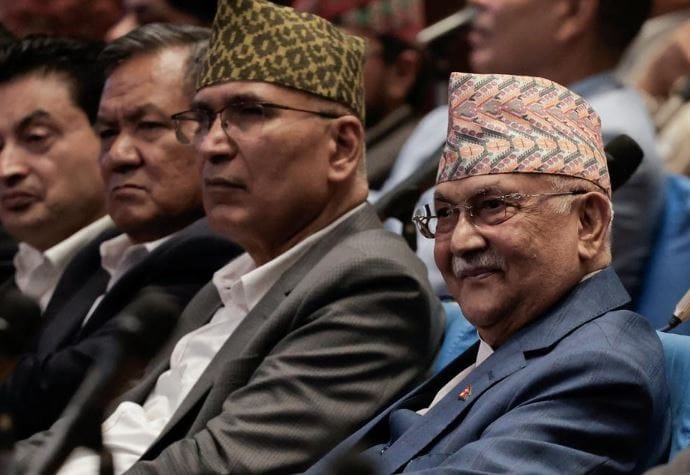A Triumphant Return to Leadership
K.P. Sharma Oli’s Strategic Comeback
K.P. Sharma Oli, a seasoned political figure in Nepal, has been appointed as the Prime Minister for the third time, following a dramatic shift in the country’s political landscape. This appointment comes after Pushpa Kamal Dahal Prachanda’s defeat in the House of Representatives, leading to the necessity for a new coalition government under Article 76 (2) of the Constitution. Oli’s return to power marks a significant moment in Nepal’s ongoing quest for political stability.
President Ram Chandra Paudel officially appointed Oli as the new Prime Minister, supported by a coalition between the Communist Party of Nepal-Unified Marxist Leninist (CPN-UML) and the Nepali Congress (NC). Oli, 72, along with his new cabinet, is set to be sworn in on July 15, facing the immense task of navigating Nepal through its current political turbulence.
Coalition Dynamics and Strategic Alliances
Oli’s ascension to the premiership was backed by a coalition with NC president Sher Bahadur Deuba. This strategic alliance was solidified when Oli presented the signatures of 165 House of Representatives members to stake his claim for leadership, comprising 77 from CPN-UML and 88 from NC. This coalition underscores the complex interplay of political forces within Nepal and highlights Oli’s adeptness in forging necessary alliances to secure his leadership position.
Oli’s previous tenures as Prime Minister, from October 2015 to August 2016 and February 2018 to July 2021, were marked by significant political events and challenges. His experience in navigating these challenges positions him as a seasoned leader ready to tackle the current issues facing Nepal.
The Path Ahead: Challenges and Expectations
The new coalition government faces a daunting array of challenges, chief among them being the provision of political stability. Nepal’s political environment has been marked by frequent changes in leadership and coalition dynamics, creating an atmosphere of uncertainty. Oli’s leadership will be crucial in establishing a stable government capable of addressing the nation’s pressing issues.
Oli’s immediate focus will likely be on consolidating his coalition’s power and addressing the internal conflicts that have plagued Nepal’s political landscape. Effective governance and policy implementation will be critical in restoring public confidence and ensuring the country’s progress.
Political Stability in Nepal: The Crucial Task
Focus Keyword: Political Stability
Oli’s return to the premiership brings with it the hope of achieving political stability, a focus keyword that encapsulates the primary objective of his administration. The stability of Nepal’s political environment is essential for economic development, social cohesion, and overall national progress.
Addressing Internal Conflicts
One of Oli’s primary tasks will be to address the internal conflicts that have been a significant source of instability in Nepal. This includes managing the diverse interests within his coalition and ensuring that the government functions cohesively. By fostering unity within the coalition, Oli can create a more stable and effective government.
Strengthening Governance and Public Confidence
Oli’s leadership will be tested in his ability to strengthen governance structures and restore public confidence. This involves transparent and accountable governance, effective policy implementation, and addressing the needs and concerns of the populace. By demonstrating a commitment to good governance, Oli can rebuild trust in the political system.
The Road to Economic Development
Economic Challenges
Alongside political stability, economic development is a critical focus for Oli’s administration. Nepal faces numerous economic challenges, including poverty, unemployment, and underdeveloped infrastructure. Addressing these issues will require comprehensive economic policies and strategic investments.
Infrastructure Development
Investing in infrastructure development is vital for Nepal’s economic progress. This includes improving transportation networks, energy infrastructure, and digital connectivity. By prioritizing infrastructure projects, Oli’s government can stimulate economic growth and improve the quality of life for Nepalese citizens.
International Relations and Trade
Strengthening international relations and trade partnerships will also be a key component of Nepal’s economic strategy. Oli’s administration will need to navigate complex geopolitical dynamics and foster positive relationships with neighboring countries and international organizations. Enhancing trade opportunities can boost economic growth and create new avenues for development.
Conclusion: A New Chapter for Nepal
K.P. Sharma Oli’s appointment as Nepal’s Prime Minister for the third time marks a new chapter in the country’s political journey. With the support of a strategic coalition, Oli faces the significant task of navigating political instability, addressing internal conflicts, and fostering economic development. His leadership will be crucial in steering Nepal towards a stable and prosperous future.
Summary
K.P. Sharma Oli has been appointed as Nepal’s Prime Minister for the third time, succeeding Pushpa Kamal Dahal Prachanda. Oli, supported by a coalition between CPN-UML and NC, faces the challenge of providing political stability and addressing internal conflicts. His leadership will focus on strengthening governance, economic development, and fostering international relations.
Key Learning Points
| Key Learning Points | Details |
|---|---|
| Leadership Appointment | K.P. Sharma Oli appointed as Prime Minister for the third time |
| Coalition Dynamics | Supported by CPN-UML and NC coalition, highlighting strategic alliances |
| Challenges Ahead | Providing political stability, addressing internal conflicts, fostering economic development |
| Economic Focus | Prioritizing infrastructure development, international relations, and trade partnerships |
| Governance Strategy | Emphasis on transparent and accountable governance to restore public confidence |
Soumya Smruti Sahoo is a seasoned journalist with extensive experience in both international and Indian news writing. With a sharp analytical mind and a dedication to uncovering the truth, Soumya has built a reputation for delivering in-depth, well-researched articles that provide readers with a clear understanding of complex global and domestic issues. Her work reflects a deep commitment to journalistic integrity, making her a trusted source for accurate and insightful news coverage.



